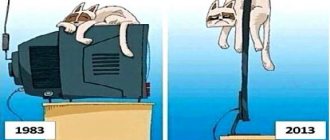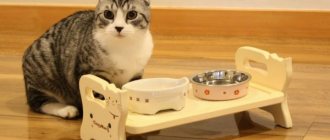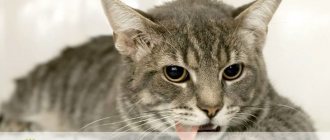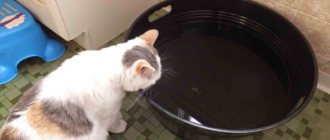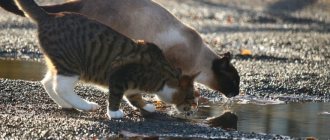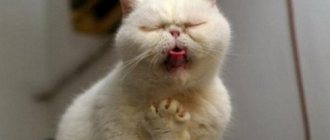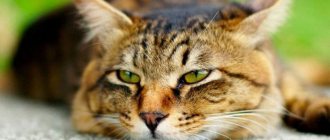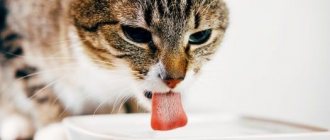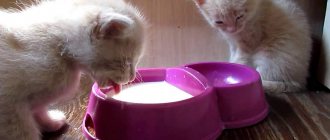22159Administration
1
What should an owner do if his cat doesn’t eat, just drinks water and sleeps? Firstly, be glad that the animal at least drinks. After all, cats are 70% water. If you reduce this rate, say, by 10%, death is guaranteed. And secondly, if the cat doesn’t eat anything and just sleeps, that’s also good. Sleep is sometimes the best medicine.
But, be that as it may, when a pet does not eat for several days, at this pace it can last up to a maximum of 5 days.
Is it dangerous
If a cat refuses food because it is not to his taste, there is no need to worry. It is enough to change the food, and the pet will happily pounce on it.
But when not a single trick gives a positive result, and the cat ignores any food, but does not stop greedily lapping up water, you need to look for the reason.
Starvation is dangerous for animals and has serious consequences.
Even in a completely healthy cat, abstaining from food for 2-3 days provokes a failure in metabolic processes. This negatively affects the condition of the liver and can lead to a dangerous disease - lipidosis.
When to sound the alarm
Warning signs that should not be ignored:
- The cat is sick all the time. Vomit comes with yellow foam, admixtures of blood, or contains fragments of undigested food.
- The pet drinks a lot, but at the same time cannot go to the toilet normally.
There is copious discharge from the eyes and nose.- Sometimes the symptoms are complemented by pain, then the cat takes a tense pose and meows pitifully.
- The pet looks for a secluded place and sleeps there day and night.
If you pick up a cat, you can feel that its temperature has risen. A dry nose will confirm this.
If at least 1 of the described symptoms is present, the animal should be taken to a veterinarian. This will help to identify serious pathology in a timely manner.
Common reasons
When a cat has been ignoring food for several days and has lost a lot of weight, the situation can end badly if the factor that influenced the animal’s appetite is not found.
In some cases, refusing to eat may be the only sign of a health problem. It could be:
- viral infection;
- intoxication;
- toothache;
- loss of smell, etc.
Some causes occur rarely, while others affect every second pet. Even a common cold can cause a lot of trouble.
Factors that negatively affect appetite
| Cause | Description |
| Damage to the mucosa | Playful cats often grab various objects in their teeth and may accidentally swallow them. A foreign body sometimes enters the stomach along with poor-quality food. Fish and chicken bones can damage the mucous membrane. Injury causes pain and provokes the development of inflammatory processes (sometimes bleeding) |
| Anorexia | Loss of appetite is common in small animals and is one of the signs of the disease. The reasons may vary from infection to cancer. Most often, anorexia, accompanied by drowsiness, manifests itself in liver diseases |
| Problems with the gastrointestinal tract | Malfunctions in the digestive system can be caused by gastritis, ulcers and other pathologies, due to which the production of bile is disrupted. Another reason is wool accumulated in the stomach. Most often occurs in smooth-haired pets. When licking, the cat swallows hairs that stick to the walls of the stomach and roll into lumps. |
Such problems are difficult to diagnose by visual inspection. A whole range of biochemical and hardware studies will be required.
Therefore, if the cat has become lethargic and refuses to eat, it must be taken to a veterinary clinic.
Where does SKD come from?
Possible reasons:
- disturbance of cerebral blood supply - a change in the circulatory system of the brain due to hypoxia caused by heart disease, hypertension, anemia, impaired blood clotting, the formation of small hemorrhages near blood vessels, arteriosclerosis
- tissue damage from free radicals As cells age, they process nutrients less and less well, the amount of energy decreases, and the number of free radicals in the cells increases, which the body’s antioxidant defense does not have time to neutralize. An excess of these radicals leads to tissue damage, with brain tissue being especially sensitive.
Liver dysfunction
This organ is of great importance for the coordinated functioning of the entire body. Its functions are stimulation of digestion, participation in metabolic processes, protection of the immune system, neutralization of toxins, production of important enzymes and much more. Fasting leads to failures.
Diagnosing liver problems is difficult and will require a lengthy examination. If your pet does not eat and only drinks water, there is reason to suspect something is wrong: liver dysfunction is always accompanied by severe thirst.
Other symptoms may include:
- yellowness of the mucous membranes as the first sign of a problem;
- change in the color of waste products (feces become discolored, urine darkens);
- frequent diarrhea and vomiting;
- skin problems arise - itching, dry skin, dandruff;
- the animal becomes apathetic.
If the situation is advanced, the diseased liver increases in size. This can be determined by palpation of the peritoneum.
How and how to help an animal
If a cat refuses food and water, then the first thing to do is take your pet to a veterinarian. It is not possible to make a diagnosis on your own at home, so you need to call a doctor at home or take your pet to the clinic.
If it is impossible to get to the veterinarian in the next 24 hours, then you need to provide the cat with rest. To do this, you should prepare a clean litter; it should not be too soft or too hard. If an animal is hiding, you should not force it out of its hiding place. You can only place a bowl of food and fresh water nearby.
Bowls of water and food should always be available to the animal.
If the doctor has determined the cause, then you should follow the specialist’s recommendations and give medications according to instructions in the required dosages. This must be done calmly; you must not cause pain to the animal. Before giving medication, the cat needs to be stroked, and the tone of voice should be calm. This way, the pet will tolerate the treatment better, will not resist too much and will recover faster.
Additional recommendations:
- If the cause is stress, then the cat should be left alone for a while. It is advisable to call her to eat in a gentle tone. A calm and quiet environment, the absence of extraneous noise and periodic stroking will help you recover from stress.
- If your pet doesn't like the food, you need to replace it as soon as possible. It is recommended to give preference to balanced foods rather than cheap options containing a lot of harmful additives.
- In case of gastrointestinal upset and poisoning, you can give the animal activated charcoal (500 mg per 1 kg of weight). In this case, the tablet must be crushed and dissolved in 1 tsp. water. It is most convenient to give medicine using a syringe without a needle. It is enough to do this procedure once before seeing a doctor.
- Ticks and fleas are eliminated using special antiparasitic medications. You should not use them on your own; you should first consult your doctor. However, if this is not possible in the near future, and the animal has fleas or a tick is found, you can purchase Bars or Celandine shampoo.
- If the cause is helminthic infestations, then treatment is carried out with the help of anthelmintic drugs. The medication should be given only according to the regimen recommended by the doctor. Otherwise, larvae may remain, which will provoke a relapse.
- To alleviate the condition of an animal with gum inflammation, you can use a solution of Miramistin or potassium permanganate. It is necessary to treat the gums using a cotton pad and the selected product. This needs to be done 2 times a day. Do not press on problem areas.
A weak solution of potassium permanganate can be used to treat inflamed gums
If an animal does not eat or drink, and also sleeps constantly, then this is an alarming signal of serious health problems. However, in extremely rare cases this is associated with stress. In this case, the pet should be left alone and allowed to rest. There is no danger in inactivity after stress. If the animal is lethargic, does not eat or drink for another reason, then postponing a visit to the doctor is dangerous, since with a serious pathology the cat may die.
Some recommendations that will help you hold out until the doctor arrives:
- It is necessary to ensure that fresh air enters the room.
- Do not disturb the pet. If there are other animals in the house, then for safety reasons it is better to isolate them from contact with the sick cat.
- Make sure the water in the bowl is always clean.
- If there is a special medicinal herb for cats in the house, which breeders often grow in pots, then you can pick a little and put it next to your pet. If desired, the animal can be treated with such a safe remedy.
How to help a kitten
If the kitten does not eat anything or drink water, then first of all you need to pay attention to the nature of the food. Small pets need special soft food. It is impossible to give a kitten food intended for adult animals, since the gastrointestinal tract of babies is still very weak. Long-term refusal of water is dangerous, so you can give your pet water using a pipette. Every hour you need to give water forcibly. The liquid should be administered in small quantities - one pipette at a time is enough.
Giving your kitten water using a pipette will prevent dehydration
In addition, the kitten should be carefully examined for rashes, sores and fleas. Particular attention should be paid to the withers and ears. If everything is clean, then most likely the problem lies in the functioning of the internal organs, which can only be determined in a clinical setting.
Tick bites
As the weather warms up, a cat walking outside runs the risk of contracting the ixodid parasite. Feeding on the blood of an animal, the tick injects poison into the body, causing the development of serious diseases.
If the cat has stopped eating, behaves lethargically, is breathing heavily, and the mucous membranes of the mouth and eyes have turned pale, it is recommended to examine the animal.
Particular attention should be paid to the armpits, groin, abdomen, withers and areas behind the ears - favorite places for bloodsuckers.
Problems with blood and blood vessels
This factor is rare in cats, but it should not be excluded. Especially if the pet is at risk by age.
Older cats are sometimes diagnosed with circulatory disorders, leading to strokes, thromboembolism, and heart failure.
A sick animal not only loses its appetite, but also shows signs of oxygen starvation, which is manifested by rapid breathing and drowsiness. Possible loss of coordination of movements, loss of balance, involuntary bowel movements.
If your cat begins to eat little due to kidney failure
There are two types of kidney failure in cats - acute and chronic, which are characterized by refusal to eat. There is severe emaciation of the animal, frequent vomiting and urination, as well as a constant feeling of thirst. A common cause of this condition may be poisoning from flowers of the lily family. The condition of acute renal failure can be treated with timely contact with an experienced veterinarian. Resuscitation facilities and prompt implementation of treatment procedures will help restore your pet’s health in the shortest possible time.
Diabetes
Excessive thirst against the background of anorexia may be associated with abnormalities in the functioning of the endocrine system. Even cats are not immune from diabetes. Therefore, when a cat stops eating and only drinks water, it must be examined to identify this disease.
Reasons for development
Elevated blood glucose levels in cats are caused by the following factors:
- obesity (the pet is regularly overfed);
- unbalanced diet (feed whatever is needed);
- hormonal disorders;
- diseases of internal organs;
- problems with the pancreas.
In animals, predisposition to this disease is inherited.
But the pathology can also be acquired. Diabetes is more often diagnosed in older pets (over 6 years old). The fact that the animal has begun to develop a “sweet” disease can be judged by weight loss, acetone odor from the mouth, drowsiness, and altered gait.
Treatment of pathology
Therapy is selected individually. Not only the degree of development of the disease is taken into account, but also the body’s dependence on insulin. Some will need long-acting antihyperglycemic drugs, while others will need short-acting ones.
But the dietary requirements are the same in all situations. The diet of diabetics should include high-protein foods, vegetables and dairy products. The treatment menu is agreed upon with the veterinarian.
Forecasts
High glucose levels are dangerous. If left untreated, your pet may go into a diabetic coma and die. With timely diagnosis and proper therapy, the prognosis is good (especially in non-insulin-dependent cats).
Signal of a foreign body entering the digestive tract
Most owners often encounter this problem, which is especially typical for playful cats of long-haired breeds. These could be small fragments of toys, small bones, or simply large accumulations of fur from the animal itself. The main signs for identifying this factor are attacks of vomiting that occur when drinking water and food, abdominal pain and difficulty defecating. With prompt diagnosis and timely removal of the foreign material, the pet will recover completely.
Intoxication of the body
Poisoning is a common reason for a cat to refuse to eat. The animal drinks a lot of liquid and constantly feels sick.
The rest of the symptoms depend on the type of intoxication.
Types of poisoning
| Type | Peculiarities |
| Food | Toxins enter the body through the digestive tract. The cat could have eaten stale or low-quality food, swallowed poison, chemicals, alcohol, fertilizers, mold particles, etc. Among pets, there are those who like to gnaw houseplants, many of which are poisonous. |
| Non-food | Penetration occurs through the dermis or respiratory tract. In the first case, these are insect bites (spiders, ticks, fleas) and snakes. In the second - inhalation of mercury vapor, acids, combustion products, toxic gases |
With food intoxication, diarrhea develops. The second type of poisoning is manifested by severe vomiting.
Among the common symptoms, it is worth highlighting the following:
excessive salivation;- swelling of the oral cavity;
- pale bluish or reddish tint of mucous surfaces;
- rapid breathing and moaning.
Intoxication provokes surges in blood pressure, which leads to impaired coordination. There may be an increase or decrease in body temperature.
Severe poisoning may cause muscle paralysis and coma.
Injuries or diseases of the mouth
Sometimes a cat won't eat because he has dental problems. The oral mucosa, gums, tongue and lip tissue may become inflamed. Problems are caused by tartar and pathologies that have developed in the gum pockets.
In cats, with age and poor nutrition, tooth tissue is destroyed, causing pain.
Various injuries are possible, classified into categories:
Enamel wear and tooth dislocation.- Fractures of varying degrees:
- with damage only to the enamel;
- with damage to dentin, root and crown;
- the pulp is injured;
- the root is broken.
- Dislocation or fracture of the jaw.
The entry of dangerous objects into the oral cavity can cause injury to the palate, inner surface of the cheeks, and tongue. Any violation of tissue integrity leads to the development of inflammatory processes that interfere with food intake.
Each of the problems of the oral cavity is eliminated in the office of a veterinary dentist. Self-medication is not allowed, as it can only complicate the situation.
Reasons for refusal to eat due to cat illness
Oral diseases. Stomatitis is an inflammation of the oral mucosa involving the mucous membranes of the cheeks, palate, gums, surface of the tongue and the mucous membrane of the lips. In cats, catarrhal, vesicular and hemorrhagic most often occur, and much less often ulcerative, diphtheretic and phlegmonous.
Stomatitis in a cat usually begins with catarrhal inflammation of the oral mucosa and is accompanied by: Increased salivation. Increased thirst. Chew carefully while eating (cat stomatitis).
Dental caries is a disease accompanied by progressive putrefactive destruction of hard tissues followed by the formation of a cavity in the affected tooth. The onset of dental caries development is usually overlooked by cat owners. The owner of a cat can detect dental caries in his cat due to difficulty in eating and chewing food, as a result of the appearance of a pain reaction, the presence of salivation, the loss of swallowed food particles from the oral cavity and an unpleasant odor (bad breath in a cat) that comes from the cat’s oral cavity, purulent or bloody discharge from the mouth.
Tartar. An unpleasant odor emanates from the cat’s mouth, we note atypical behavior in the cat when eating (arising from pain), the cat begins to refuse food, and exhaustion is observed (tartar in the cat).
Wounds and abscesses in the cat's mouth are accompanied by pain, which makes it difficult for the cat to eat, and as a result the cat refuses to eat.
Ear disease. Ear diseases in cats can be non-contagious or contagious in origin.
Otitis. Otitis in cats can be due to inflammation of the outer, middle and inner ear.
Causes of otitis. The cause of otitis in cats can be food allergies, the presence of parasites (ticks, fleas), ear injuries, foreign bodies, etc. Otitis of the middle and inner ear can be the result of complications of inflammation of the outer ear.
Signs of otitis. During a clinical examination of a sick cat, the skin of the sore ear is reddened, the cat rubs the sore ear with its paw, and tries to keep the sore ear folded and pressed to its head. If the pain in the ear is acute, “shooting,” the cat suddenly jumps up, looks around in fear, and screams. With constant pain, the cat does not allow the sore ear to be touched, avoids stroking the head, and presses the sore ear to its bedding. With purulent otitis media, inflammatory exudate is released from the cat's ear; when touched, the ear gurgles and squelches. An unpleasant odor emanates from the diseased ear. In advanced cases, in the absence of proper treatment, the cat’s body temperature rises, the cat becomes depressed, and there is no appetite. If timely treatment measures are not taken, the eardrum may be perforated, and the inflammatory process can spread to the brain (ear diseases in cats).
Other factors
There are several other reasons that make a cat refuse to eat. They are not associated with medical abnormalities and have specific symptoms.
Stress
A pet can be thrown out of its usual balance by moving to a new place of residence and a short trip by transport, rearranging the house and the presence of strangers, or the appearance of new animals.
By refusing food, a cat is not being harmful, as some owners think. Innovations in the way of life are indeed frightening and cause stress.
Hormonal syndrome
In non-castrated animals, when the “sexual activity mode” is turned on, the feeling of hunger fades into the background. The cat will begin to actively eat when it satisfies its basic instinct.
A castrated (sterilized) pet will also refuse food for some time. First, he needs to come off the anesthesia, which is making him dizzy and nauseous. Secondly, the operation puts the animal into a state of stress.
Behavioral motives
Cats are clean by nature, so they tend to feel disgusted. Even delicious-smelling food will not make your pet touch it if the food is placed in a dirty bowl.
A cat doesn’t eat, just drinks water and sleeps—is it normal or pathological?
It all depends on the presence of additional symptoms. The pet is being watched. In most cases, the situation normalizes itself and the animal becomes active again and begins to eat.
When lack of appetite is accompanied by thirst and polyuria, testing for diabetes mellitus or other chronic diseases should be performed.
What to do for treatment
If the cat stops eating, then first find out the reason. Sometimes it’s enough just to change the bowl or food. If a pet has experienced a stressful situation, it needs help to adapt after it.
The situation is more complicated with medical factors. Any of the reasons described above requires treatment, but nothing can be done at home.
The pet is taken to the veterinarian, who orders an examination to identify the disease that caused the loss of appetite.
The treatment regimen, selection of medications and optimal dosage for the cat are determined by the doctor, based on the diagnosis.
What should an owner do if a cat doesn’t eat well?
First of all, you need to decide whether the owner is able to help the pet on his own. If yes, then you need to do as described above.
If a combination of the following symptoms occurs, seek veterinary help:
- the pet does not drink or eat;
- the cat is reluctant to chew food and has difficulty swallowing;
- halitosis - bad odor from the mouth;
- the cat constantly licks itself;
- diarrhea or stool retention develops;
- salivation;
- vomit;
- the coat is tousled and dull;
- skin rashes;
- conjunctivitis, rhinitis and dry nose at the same time.
